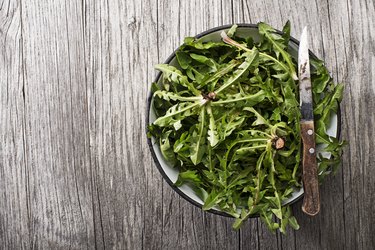
Having dandelions in your yard can be annoying, but they can be beneficial. Some cultures have used these common weeds — whose scientific name is Taraxacum officinale — to treat everything from liver ailments to heartburn to lactation problems.
You can find wine made from the yellow flowers, vitamin- and mineral-packed dandelion greens in the produce section of your supermarket, and herbal teas made from the root of the plant — but be aware of potential dandelion tea side effects.
Video of the Day
Video of the Day
Talk to your doctor about whether dandelion root tea is safe for you, because drinking it can interfere with medications and could lead to unwanted side effects.
Read more: 10 Everyday Ailments Soothed by Tea
Understand Potential Benefits
Dandelion root acts as a laxative and may aid digestion, according to the National Center for Complementary and Integrative Health. Some animal studies suggest the plant may help improve cholesterol and triglyceride levels and act as an anti-inflammatory, but research on humans is lacking for these and other purported uses.
Herbalists and alternative health care providers recommend dandelion root to detoxify the liver and gall bladder, but the evidence to support these benefits is mainly based on anecdotal reports and animal research. According to an April 2016 article published by the Journal of Applied Pharmaceutical Science, well-designed human clinical trials are needed to confirm these findings.
In fact, one of the primary jobs of your digestive organs is to detoxify the body on a routine basis. If your organs were not functioning properly and your body filled with toxins, you would be seriously ill and in need of more than tea.
Dandelion Tea Side Effects
The dandelion plant is generally considered safe for consumption, but, like other herbs, it can have adverse effects in some people. Dandelion root tea may negatively affect your digestive system, causing diarrhea, stomach inflammation or heartburn. According to the Memorial Sloan Kettering Cancer Center, dandelion root side effects can also include hypoglycemia, or low blood sugar.
Some people may experience an allergic reaction to dandelion and related plants. If you are allergic to chamomile, chrysanthemums, marigold, yarrow and the ragweed plant family, dandelion tea may not be right for you. Allergy symptoms seem to occur more often, however, when sensitive people simply touch the weed directly.
Contact can cause itching and rash, inflamed eyes, a runny nose or difficulty breathing. If you have any of these side effects after drinking dandelion tea, discontinue use and consult a doctor.
Beware Interaction with Medications
Dandelion has the potential to affect your medications, although this may occur primarily with the leaf of the plant and not the root. For example, dandelion can make medications leave your body more quickly. People on blood-thinning medications may be at risk of bleeding if they take dandelion, and diabetics may find that the herb lowers their blood sugar.
Dandelion may also worsen the side effects of some drugs, such as lithium — a treatment for bipolar disorder — according to Glens Falls Hospital. Given dandelion's numerous potential drug interactions, it's wise to talk to your doctor about drinking dandelion root tea.
Drinking Dandelion Root Tea
You can find dandelion root as dried loose tea or in teabags at the supermarket. It can have a slightly bitter flavor, and may benefit from a sweetener like honey. If you're ambitious, you can also pick your own roots, then chop and roast them to make a dandelion root "coffee" with a flavor that's close to coffee. But because it doesn't contain caffeine, you can drink dandelion tea before bed.